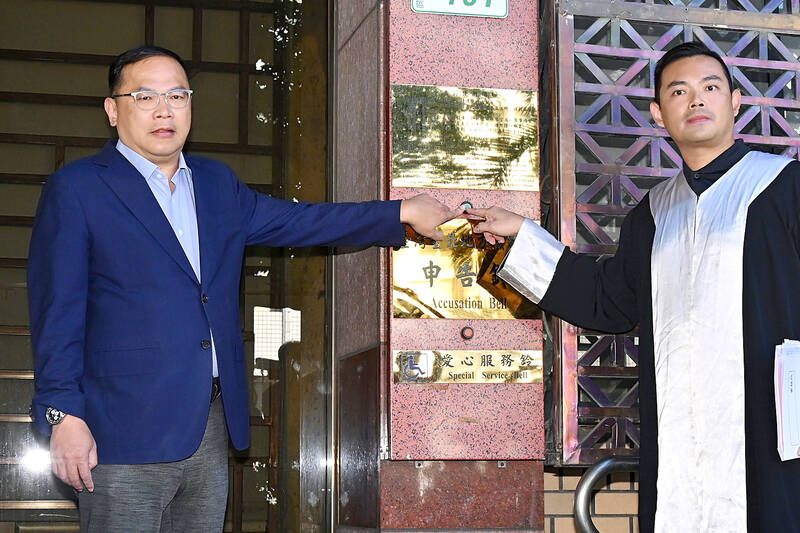Democratic Progressive Party (DPP) Legislator Wang Yi-chuan (王義川) yesterday filed a lawsuit against seven people, including Taiwan People’s Party (TPP) Chairman Huang Kuo-chang (黃國昌), saying they received foreign funding in breach of national security and contravened personal privacy laws through the surveillance of politicians.
The Chinese-language Mirror Daily on Friday last week said Huang allegedly organized a team of reporters and photographers in 2022 to track DPP politicians.
Accompanied by his lawyer, Chen Chun-wei (陳君瑋), Wang submitted a criminal complaint to the Taipei District Prosecutors’ Office against Huang, Kai Ssu International Co (凱思國際) owner Lee Li-chuan (李麗娟), journalist Hsieh Hsing-en (謝幸恩) and four photographers said to be part of the alleged surveillance team.

Photo: George Tsorng, Taipei Times
Chen cited the report as saying that Hsieh allegedly directed four photographers to tail Wang by car for nine days in June last year.
He said the seven contravened provisions of the Personal Data Protection Act (個人資料保護法), the Social Order Maintenance Act (社會秩序維護法) and committed offenses against privacy (妨害秘密罪) under the Criminal Code.
Hsieh and the photographers were allegedly hired and paid by Kai Ssu International Co, which Chen said received major funding from Hong Kong, contravening the National Security Act (國家安全法).
Asked about the alleged offenses against privacy, Chen said that a public figure should not have every aspect of his personal life exposed.
“A media team followed Wang for days in cars, photographing even minor infractions such as an unauthorized left turn at a red light. Such pervasive surveillance, disregarding the boundary between public and private activity, clearly contravenes the law and was carried out for political power struggles,” he added.
Huang yesterday dismissed Wang’s complaint as a “frivolous lawsuit” orchestrated by the DPP.
The controversy traces back to June last year, when Chinese Nationalist Party (KMT) Legislator Hsu Chiao-hsin (徐巧芯) publicly released photographs of Wang’s car allegedly making an illegal left turn. Wang subsequently asked prosecutors to investigate who had been surveilling him.
In late August, prosecutors declined to indict, saying that the surveillance posed no threat to public safety.
The investigation at the time determined that four people had rented a car and claimed to be media staff employed by Kai Ssu International, a company that does not operate any news publication.
Additional reporting by CNA

The Executive Yuan yesterday announced that registration for a one-time universal NT$10,000 cash handout to help people in Taiwan survive US tariffs and inflation would start on Nov. 5, with payouts available as early as Nov. 12. Who is eligible for the handout? Registered Taiwanese nationals are eligible, including those born in Taiwan before April 30 next year with a birth certificate. Non-registered nationals with residence permits, foreign permanent residents and foreign spouses of Taiwanese citizens with residence permits also qualify for the handouts. For people who meet the eligibility requirements, but passed away between yesterday and April 30 next year, surviving family members

The German city of Hamburg on Oct. 14 named a bridge “Kaohsiung-Brucke” after the Taiwanese city of Kaohsiung. The footbridge, formerly known as F566, is to the east of the Speicherstadt, the world’s largest warehouse district, and connects the Dar-es-Salaam-Platz to the Brooktorpromenade near the Port of Hamburg on the Elbe River. Timo Fischer, a Free Democratic Party member of the Hamburg-Mitte District Assembly, in May last year proposed the name change with support from members of the Social Democratic Party and the Christian Democratic Union. Kaohsiung and Hamburg in 1999 inked a sister city agreement, but despite more than a quarter-century of

Taiwanese officials are courting podcasters and influencers aligned with US President Donald Trump as they grow more worried the US leader could undermine Taiwanese interests in talks with China, people familiar with the matter said. Trump has said Taiwan would likely be on the agenda when he is expected to meet Chinese President Xi Jinping (習近平) next week in a bid to resolve persistent trade tensions. China has asked the White House to officially declare it “opposes” Taiwanese independence, Bloomberg reported last month, a concession that would mark a major diplomatic win for Beijing. President William Lai (賴清德) and his top officials

‘ONE CHINA’: A statement that Berlin decides its own China policy did not seem to sit well with Beijing, which offered only one meeting with the German official German Minister for Foreign Affairs Johann Wadephul’s trip to China has been canceled, a spokesperson for his ministry said yesterday, amid rising tensions between the two nations, including over Taiwan. Wadephul had planned to address Chinese curbs on rare earths during his visit, but his comments about Berlin deciding on the “design” of its “one China” policy ahead of the trip appear to have rankled China. Asked about Wadephul’s comments, Chinese Ministry of Foreign Affairs spokesman Guo Jiakun (郭嘉昆) said the “one China principle” has “no room for any self-definition.” In the interview published on Thursday, Wadephul said he would urge China to